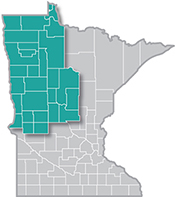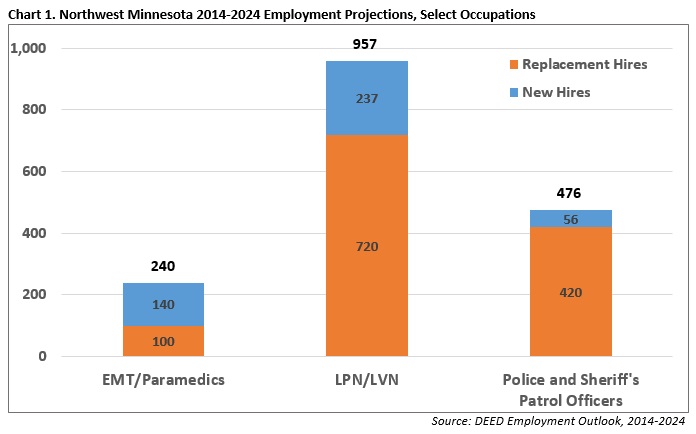 The presence of such industry powerhouses as Polaris, Arctic Cat and New Flyer make Northwest Minnesota a hub of transportation equipment manufacturing.
The presence of such industry powerhouses as Polaris, Arctic Cat and New Flyer make Northwest Minnesota a hub of transportation equipment manufacturing.
From wheat and potatoes to soybeans and sugar beets, the region is a major producer and processor of food staples and specialty agricultural products.
Want the freshest data delivered by email? Subscribe to our regional newsletters.
11/4/2016 12:04:56 PM
Chet Bodin
In Northwest Minnesota and the state as a whole, veterans are an important and valued part of the workforce. In Northwest Minnesota, 11 percent of the population and six percent of the workforce are veterans, which amounts to over 16,000 workers, according to the American Community Survey.
One of the top challenges for veterans transitioning to the civilian ranks is translating their military training to civilian credentials, such as professional certifications and college credits. From 2013 to 2015, Minnesota was one of six states that participated in the Veterans' Licensing and Credentialing Demonstration Project in order to pilot accelerated pathways to licensure and certification for veterans. This is important because according to DEED's most recent Job Vacancy Survey, one-third of all job vacancies statewide require a certificate or license.
In the pilot program, Minnesota focused on creating accelerated licensure for three high-demand occupations across the state: Licensed Practical Nurses, Emergency Medical Technicians, and Police Officers. Table 1 indicates the current and future need for workers in these occupations, as they are all rated as four or five stars according to DEED’s Occupations in Demand tool. In addition, over 90 percent of statewide vacancies for these jobs in the first half of 2016 required a professional license or certificate.

Accelerated licensure for these occupations is often implemented though post-secondary institutions, often referred to as “bridging programs” that award veterans credit hours up front for their prior service training, saving them time and money. For example, at Riverland Community College, a Health Care Specialist (68W) who has received training through the military is entitled to 26 credits toward a degree in Practical Nursing. This accounts for over half of the necessary program credits, and qualifying veterans only need to earn 13 additional credits to graduate and be eligible to take the National Council Licensure Examination for Practical Nurses (NCLEX).
In addition to college credits, some training recognized by the state now allows for immediate certification. Again, Health Care Specialists (68W), who are required to maintain certification from the National Registry of Emergency Medical Technicians during their service, can apply and become licensed in Minnesota without any additional schooling.
In addition, Minnesota State Colleges and Universities also offer transfer credits for military training in a variety of other instructional programs, whether the occupations require a professional certificate or license or not.
Veterans and employers in Northwest Minnesota will definitely benefit from accelerated licensure, since Nurses, EMTs, and Police Officers are even more in demand in the Northwest than the rest of the state. All three occupations have five star demand indicators in every region of Northwest Minnesota, and are projected to have a significant number of regional openings through 2024. An estimated 1,673 workers will be needed to fill vacancies in just these three occupations by 2024 (Chart 1).

Ideally, accelerated certification options will become more available and known to veterans in Northwest Minnesota. Regionally, the unemployment rate for veterans remains about 1.5 percent higher than for non-veterans, indicating there is room to add workers from their ranks. Through the Demonstration Project and other experiments, Minnesota has been a leader in veteran credentialing, and Minnesota veterans deserve to have their training and skills recognized in a way that allows for a smooth transition from military service to civilian employment.
Contact Chet Bodin.